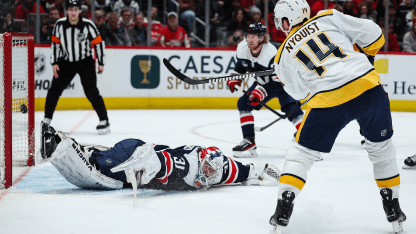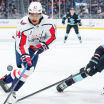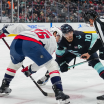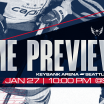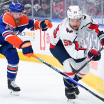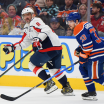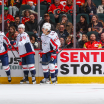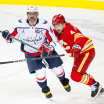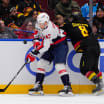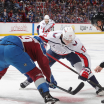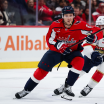Washington dropped its fourth straight game (0-2-2) on Saturday night at Capital One Arena, falling 3-2 to the visiting Nashville Predators in the shootout. But they sure felt like they should have and could have won this game by the same score in regulation.
With time ticking down to the final minute of regulation and the score tied at 2-2, the Caps had six skaters on the ice because of a delayed penalty call on Nashville defenseman Luke Schenn. John Carlson fed Caps’ captain Alex Ovechkin, who fired a shot through a screen and past rookie Nashville netminder Yaroslav Askaraov with 59.5 seconds remaining.
To the eyes of the sellout crowd, it appeared as though the Caps had taken the lead. But that’s when the long arm of the law intervened; the Hockey Operations war room in Toronto took over and decided that referees Beau Halkidis and Eric Furlatt – who seconds earlier had signaled a good goal on the ice – should take a closer look.
They did, and they decided that Caps’ center Nic Dowd brushed Askarov at the top of the paint, an instance of goaltender interference that took the goal – which would have been Ovechkin’s second of the game and the 500th assist of Carlson’s career – off the board.
Washington then went on the power play, failed to score, and the Preds prevailed in the shootout.
“I would have liked that to have counted,” says Caps’ coach Spencer Carbery, stating the obvious. “My opinion on it, from going through tons of reviews from a study on it, or a project on it, my personal take is there’s not enough there to overturn. Especially the ‘overturn,’ because that’s where it gets tricky, because when it’s called a goal on the ice, it needs to be very, very evident to overturn. That’s the way it’s been described to us from the League.”
Each time the Toronto Hockey Operations crew gets involved in a decision, reporters covering that game receive an email explaining the ruling. Ironically, if the puck had entered the net a single second earlier, Toronto would not have been able to assert its authority in this situation; the decision would have fallen on the shoulders of Preds coach Andrew Brunette.
“We just looked at it,” says Carbery. “The puck actually goes in [with just over a minute left], so if [the clock] stops technically when the puck goes in the net, then they can't review it in Toronto unless it gets challenged. Now [Nashville has] got a choice to make: Do you try to go six-on-five, or do you risk it, challenge it? And now you'd be in a real tough spot, if you challenge and failed it.”
Here’s how the League’s Saturday night ruling from Washington read in the email to reporters (italics and bold are from NHL Situation Room):
Explanation:
Video review determined Washington’s Nic Dowd impaired Yaroslav Askarov’s ability to play his position in the crease prior to Alex Ovechkin’s goal. According to Rule 69.3, “If an attacking player initiates contact with a goalkeeper, incidental or otherwise, while the goaltender is in his goal crease, and a goal is scored, the goal will be disallowed."
NOTE: In the final minute of play in the third period and at any point in overtime (regular season and playoffs), Hockey Operations will initiate the review of any scenario that would otherwise be subject to a coach’s challenge.
Saturday’s game was the second of back-to-backs for both clubs, both teams were seeking to shake off identical 0-2-1 three-game slides, and both clubs were forced to deploy their “third” goaltender on the organizational depth chart for the game. That’s 28-year-old undrafted free agent Hunter Shepard for the Caps, and it’s 21-year-old Askarov, the first goaltender drafted (11th overall) in the 2020 NHL Draft for Nashville. Both goaltenders entered Saturday’s tilt with precisely two games worth of NHL experience, and both were excellent.
The Preds peppered Shepard with shots early on, and Nashville’s Luke Evangelista started the scoring at 2:44 of the first, scoring on his team’s fifth shot of the night. From his knees and from the slot, Evangelista put back the rebound of a Dante Fabbro point shot to put the Preds on top.
Nashville kept the heat on in the Washington zone, and Ovechkin took a cross-checking penalty during an extended shift in the defensive zone. The Preds doubled their lead on the ensuing power play when Roman Josi slipped a wrist shot through traffic from center point at 6:55 of the first.
Just after the midpoint of the opening frame, the Caps cut into the lead with a rebound goal of their own, a rather rare occurrence to this point of the season. From the right point, Trevor van Riemsdyk put a shot toward the cage, and Dowd put a tip on it. Askarov made the save, but Beck Malenstyn was in perfect position to bury the rebound at 10:25 to make it a 2-1 contest.
“It wasn’t an ideal start for us,” says Malenstyn. “But we had a focus today of sending more pucks toward the net with body presence there, and we were fortunate to be on the right side of that one."
Playing his first game in a Caps’ sweater, Ethan Bear turned in a solid performance on Saturday, logging 20:05, all but 13 seconds of it coming at even strength. In the front half of the second period, he cranked a shot from center point that rang iron, nearly tying the game.
Washington was able to square the score later in the frame, doing so just seconds after an unsuccessful power play expired. For the first time this season, Ovechkin scored on a one-timer from his left dot office, this one via a tee up feed from Dylan Strome at 14:59 of the second period. Ovechkin’s seventh of the season – and the 829th of his NHL career – made it a 2-2 tilt.
Less than two minutes later, the Caps needed an otherworldly save from Shepard to keep it tied; sprawled on the ice, he reached up and gloved a Tommy Novak shot from in tight to keep the game even.
Both netminders made more big stops in the third, leading to Ovechkin’s overturned tally, which in turn helped lead to Askarov’s first NHL victory.
“I thought he was really good,” says Preds’ coach Andrew Brunette. “I’m happy for him to get his first one. I thought he was outstanding at the times he needed to be.”
Playing for the third time in four nights and coming off consecutive 5-1 losses, Saturday’s result was a reminscent of some games early in the season. The Capitals fell down a couple of goals early, gradually and diligently dug their way out of that hole to draw even, and eventually had a video review call go against them. Earlier in the season, they were on the wrong end of five such calls in a span of seven games.
“It’s obviously frustrating,” says Malenstyn. “You want those to go in, you’re celebrating and you feel like you’ve got it, and it gets swiped away from you. But their job is to make those decisions, and you don’t always have to agree with them.”
“The challenge doesn’t go our way, which would have been nice to get that win,” laments Carbery. “And especially for [Ovechkin]; it would have been his second goal. He gets that one at the end of the power play. But to get that one, too, in dramatic fashion, would have ended 2023 on a good note.”

